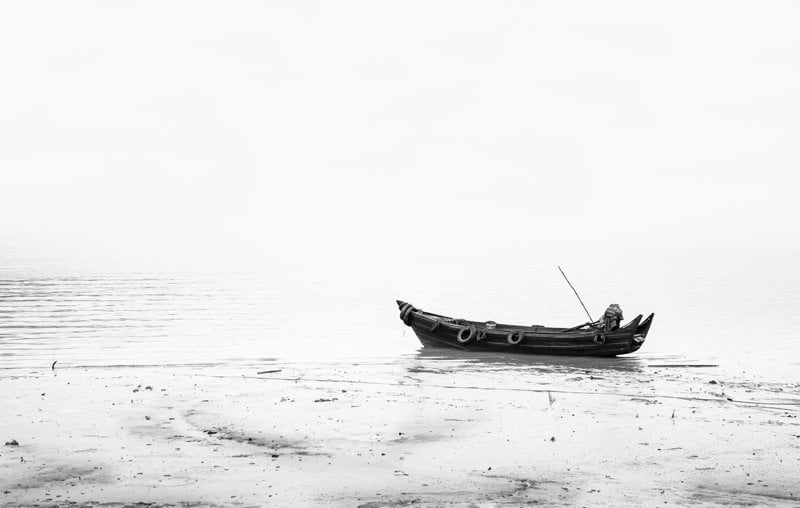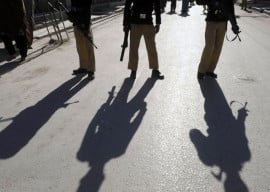
Four hundred years have passed since its first residents settled here, but the fate of Rehri Goth’s fishing community has still not changed. A lack of health facilities and drug addictions claim precious lives in the area on an almost daily basis.
“Every mother here has lost a son or two to drugs as they are sold openly,” the Pakistan Fisherfolk Forum field media coordinator, Kamal Shah, told The Express Tribune. “In recent months, almost every day one or two people, including women and boys as young as eight years of age, die because of drugs such as heroin and hashish.”

Addictions run in entire families and often tear them apart. “My three sons are all heroin addicts,” said 40-year-old Marvi. “I repeatedly asked them to quit but they never listened. I have now started doing heroin, too, to get back at them.”
Some think that the provincial government is to blame; others believe even the government is helpless. “The PPP government failed to work in Rehri Goth as the drug mafia is stronger than the government,” said former Rehri Goth MPA Muzaffar Ali Shajra. He believes the residents are to blame for their own miseries. “Most men go for a fishing trip and then sit at home for the next six months and spend all their money on gutka, drugs and raw liquor,” he said. “Whenever we tried to stop the supply of drugs, they protested. If they are poor, how do they spend so much money on drugs?”
On the other hand, current MPA Haji Shafi Ali Jamot said that the drug mafia is being protected by the government and the police.
A lack of hospitals
Drugs are not the only ill that plagues the area; the child mortality rate is also extremely high.
“During the day we can go to some small centres being run by private hospitals, but at night we have nowhere to go,” said 22-year-old Hameeda Kanwal, a mother of three. “A number of women and children die before they can be taken to a hospital. In fact, most of the times we don’t even have the money to go to a hospital.”
The situation is almost the same as it was four decades back, recalls 55-year-old Zubaida, who has been working as a community health worker for a small centre being run by the Aga Khan Hospital. “There was no one in Lalabad, a small area adjacent to Rehri Goth, who could assist me in the delivery of my first child,” she said. “I gave birth to my child without anyone’s help.”
A 36-bed hospital was constructed a few years ago and machinery worth millions of rupees was bought. However, the hospital rusts away as the government failed to appoint any doctors or paramedics.
“Small health centres like ours are trying to create awareness among the people and make a difference in their lives,” said Dr Rakshinda Faheem, who has been working at Aga Khan’s centre for the last four years. “Due to a lack of education and poverty, women do not pay attention to what we tell them about hygiene and other issues regarding infants.”
Role of women
As is often the wont of such areas, it is the women that suffer the most. Whatever the men earn from fishing, they spend it on drugs and alcohol. Decades ago, women used to head their families and the children were recognised by their mother’s name rather than their father’s. Some women ran tea stalls and others used to go on fishing trips. The women used to peel and dry the fish and knit the fishing net if it needed repair. “The role of women in fishing came to an abrupt end when fishing became commercialised in 1979 and the fishermen’s living conditions deteriorated,” said Pakistan Fisherfolk Forum chairman Mohammad Ali Shah.
Save the fishing profession
Pakistan Fisherfolk Forum chairperson Mohammad Ali Shah believes the government needs to help save the country’s fishermen. “The fishing community is being neglected and marginalised by the state and nothing has been done for its welfare or survival,” said Shah. He suggested that Rehri Goth should be developed on Karachi’s pattern and that the government should introduce fishermen development packages as the funds currently allocated to the region are insufficient and often only fill the pockets of corrupt politicians.
It’s hard to believe that for a 60,000-strong population of Rehri Goth, there are no government hospitals, schools or colleges. The residents live without basic facilities such as electricity, drinking water and gas and sewerage systems.
The former Rehri Goth MPA, Muzaffar Ali Shajra, believes that nothing can be done for the people as they themselves don’t desire change. “What can one do if a community does not want to change its fate?” asked Shajra.
However, the current MPA, Haji Shafi Ali Jamot, believes that the previous government took advantage of the people and did little to help them. “Sewage is falling into the sea and is destroying the mangroves,” he said, adding that the thousands of gallons of sewage water that is destroying the mangroves can be recycled and used to irrigate the land. “We discussed this scheme with the federal government but nobody knows when it will be implemented,” he said. “The Karachi Metropolitan Corporation and private industries can also play their part but nobody seems to care about this region.”
Published in The Express Tribune, June 2nd, 2014.

















COMMENTS
Comments are moderated and generally will be posted if they are on-topic and not abusive.
For more information, please see our Comments FAQ